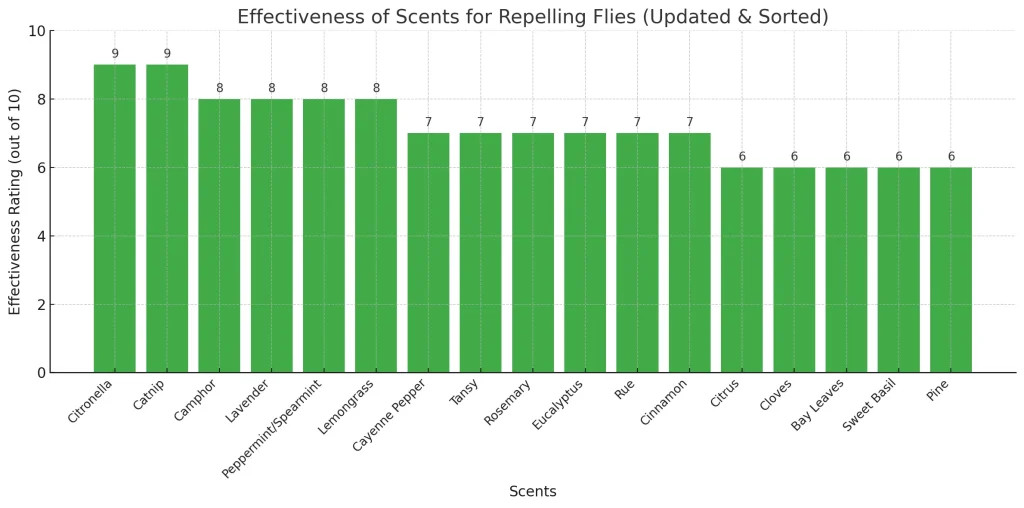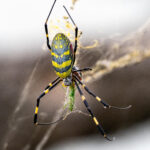Flies, whether they’re buzzing house flies, pesky fruit flies, or drain flies emerging from your sink, are more than just a seasonal annoyance. They’re vectors of germs and diseases, capable of transmitting serious illnesses like typhoid fever and tuberculosis, posing a genuine threat to your family’s health and comfort. If you’re constantly battling these unwelcome guests in your kitchen, around your patio, or anywhere in your living space, know that you’re not alone. Many homeowners seek effective and natural ways to reclaim their homes from these persistent pests.
Fortunately, nature offers a simple and pleasant solution: scents that flies find utterly repulsive. Instead of resorting to harsh chemical sprays, you can harness the power of fragrance to create a fly-free environment. This guide will explore the most effective scents that repel flies, providing practical strategies for using them both indoors and outdoors, ensuring your home becomes a haven free from these irritating and potentially harmful insects.
Scents That Attract Flies: Knowing Your Enemy
Before we arm ourselves with fly-repelling fragrances, it’s crucial to understand what attracts these pests in the first place. Knowing the scents that lure flies can help you eliminate attractants from your home and garden, making your space less inviting to them.
Here’s a breakdown of scents that commonly attract different types of flies:
- House Flies: These flies are drawn to the smell of decay and decomposition. Think of pungent, unpleasant odors like rotting meat, decaying garbage, and animal waste. Uncovered trash cans are a major attractant for house flies, especially those containing food scraps. They are also attracted to manure and pet feces in yards, which can then lead them closer to your home.
- Fruit Flies: Sweet and sugary smells are magnets for fruit flies. Overripe or fermenting fruits left on countertops, spilled soda or juice, alcohol, and even vinegar can attract them in droves. They are experts at finding and exploiting sugary spills and forgotten fruit bowls.
- Drain Flies: Moist, mildewy, and stagnant smells are what draw drain flies. They are attracted to the organic matter that accumulates in drains, such as food particles, hair, and soap scum. These environments provide ideal breeding grounds for them.
Understanding these attractants is the first step in fly prevention. By minimizing these smells in and around your home, you can naturally reduce fly populations before even deploying repellent scents.
What Scents Do Flies Hate? Nature’s Fly Repellents
The good news is that while flies are attracted to some of the most unpleasant smells imaginable, they are strongly repelled by a variety of scents that humans generally find pleasant, or at least more tolerable than rotting garbage. This opens up a world of natural, fragrant options for keeping flies away while also freshening up your living spaces.
Here are some of the most effective scents that flies detest, categorized with effectiveness ratings to help you choose the best options for your needs:
Fly-Repelling Scent Effectiveness Ratings
 Effectiveness Of Scents For Repelling Flies Bar Chart
Effectiveness Of Scents For Repelling Flies Bar Chart
A bar chart visually representing the effectiveness of different scents in repelling flies, with scents like Catnip and Citronella rated highest, and others like Citrus and Cloves rated lower.
Catnip – 9/10
Catnip isn’t just for cats; it’s a potent fly repellent too! This herb contains nepetalactone, a compound known to be highly attractive to cats but intensely disliked by many insects, including flies. Growing catnip is a dual-benefit solution, providing entertainment for your feline companions while simultaneously deterring flies.
- Indoor Use: Place potted catnip plants on windowsills, especially in kitchens or areas prone to flies.
- Outdoor Use: Plant catnip in gardens or around patios to create a natural fly-repelling barrier.
- Pro Tip: Create a catnip spray by brewing a strong tea, cooling it, and using it to mist patios, doorframes, and other fly-prone areas.
Citronella – 9/10
Citronella is widely recognized for its mosquito-repelling properties, but its effectiveness extends to flies as well. The strong, lemony scent of citronella is overwhelming to flies, causing them to avoid areas where it’s present.
- Indoor Use: Diffuse citronella essential oil or use citronella-scented sprays in kitchens and living areas.
- Outdoor Use: Burn citronella candles on patios and decks, or plant citronella grass around outdoor seating areas.
- Pro Tip: Rub fresh citronella leaves between your hands to release their oils and then apply the oils to surfaces where flies are a problem.
Camphor – 8/10
Camphor, derived from the camphor tree, possesses a powerful, pungent aroma that flies find highly offensive. Its strong scent acts as an effective deterrent, making it a useful option for keeping flies away from both indoor and outdoor spaces.
- Indoor Use: Use camphor essential oil in a diffuser to disperse its scent throughout your home.
- Outdoor Use: Burn camphor tablets or branches in outdoor areas like patios to create a fly-free zone.
- Pro Tip: Create a camphor spray by mixing camphor oil with water and applying it to hard-to-reach areas like shelves and corners.
Lavender – 8/10
Lavender, celebrated for its relaxing and soothing fragrance, is also a natural fly repellent. Its pleasant scent to humans is quite the opposite for flies, making it a wonderful, aromatic way to keep these pests at bay.
- Indoor Use: Hang dried lavender bunches near windows or doorways, or diffuse lavender essential oil in rooms where flies are common.
- Outdoor Use: Plant lavender bushes around patios and gardens for a beautiful and functional fly barrier.
- Pro Tip: Make lavender sachets and place them in drawers, cupboards, and closets for long-lasting fly protection and a pleasant aroma.
Lemongrass – 8/10
Lemongrass, with its fresh, citrusy, and slightly earthy scent, is another excellent natural fly repellent. Its aroma is invigorating to humans but sends a clear “stay away” message to flies.
- Indoor Use: Diffuse lemongrass essential oil or add a few drops to mop water for a fly-repelling floor cleaner.
- Outdoor Use: Plant lemongrass near patios and garden paths to naturally deter flies from these areas.
- Pro Tip: Lemongrass oil can be a base for DIY fly repellent sprays, offering both cleaning and pest control benefits.
Cayenne Pepper – 7/10
Cayenne pepper’s spicy and pungent odor is highly irritating to flies. This fiery scent acts as a deterrent, effectively keeping flies away from treated areas. However, use cayenne pepper cautiously due to its potential to irritate human eyes and noses.
- Indoor Use: Create a cayenne pepper spray by mixing cayenne powder with water and applying it to areas where flies congregate.
- Outdoor Use: Sprinkle cayenne powder around the edges of outdoor dining areas or gardens to create a fly-free perimeter.
- Pro Tip: Enhance the repellent effect by adding a few drops of vinegar to your cayenne pepper spray.
Cinnamon – 7/10
Cinnamon’s warm, spicy aroma, while inviting to us, is disliked by flies. Cinnamon sticks, cinnamon powder, or cinnamon essential oil can all be used to deter flies in a less harsh manner than cayenne pepper.
- Indoor Use: Place cinnamon sticks near windows, vents, and countertops. Diffuse cinnamon essential oil for a clean and fragrant alternative.
- Outdoor Use: Use cinnamon-scented candles on patios during outdoor gatherings.
- Pro Tip: Simmer cinnamon sticks with cloves in water on the stove for a naturally fragrant and fly-repelling home scent.
Eucalyptus – 7/10
Eucalyptus, with its refreshing and invigorating scent, is another effective fly repellent. Its strong aroma helps to clear airways for humans, while simultaneously driving away flies.
- Indoor Use: Hang dried eucalyptus branches in bathrooms or diffuse eucalyptus oil to freshen rooms and repel flies, especially drain flies.
- Outdoor Use: Plant eucalyptus trees near patios and garden beds to keep flies away from outdoor living areas.
- Pro Tip: Mix eucalyptus oil with water in a spray bottle and use it around drains to effectively deter drain flies.
Rosemary – 7/10
Rosemary, a fragrant and flavorful herb, is also a practical fly repellent. Its woody, pungent scent is disliked by flies, making it a useful plant to have around your home and garden.
- Indoor Use: Grow rosemary in pots on sunny windowsills, especially in kitchens, to naturally repel flies.
- Outdoor Use: Plant rosemary bushes near patios, seating areas, and garden beds for outdoor fly protection.
- Pro Tip: Incorporate rosemary sprigs into decorative wreaths for a stylish and fly-repelling home décor element.
Rue – 7/10
Rue, a traditional herb with a somewhat citrusy scent, is another effective fly deterrent. Its unique aroma, reminiscent of orange but with a bitter undertone, is disliked by flies.
- Indoor Use: Diffuse rue essential oil in fly-prone rooms like kitchens and pantries.
- Outdoor Use: Plant rue bushes near patios and garden beds to naturally repel flies from outdoor spaces.
- Pro Tip: Create a potent multi-scent fly repellent by mixing rue oil with lavender or citronella oil.
Bay Leaves/Laurel Leaves – 6/10
Bay leaves, also known as laurel leaves, offer a subtle scent that deters flies. As an added benefit, their gentle aroma is also known to repel other pests like mice.
- Indoor Use: Place dried bay leaves in sachets or bowls near pantry shelves, windowsills, and entryways.
- Outdoor Use: Plant fresh bay laurel shrubs near patio doors, outdoor seating areas, or garden edges for a natural barrier.
- Pro Tip: Crush dried bay leaves and sprinkle the powder near trash cans or drains for extra fly protection.
Citrus – 6/10
Citrus scents, derived from fruits like lemons and oranges, are refreshing to us but disliked by flies. Using citrus peels or citrus-scented products can help keep flies away. However, fresh citrus peels need to be replaced regularly to prevent them from attracting fruit flies as they decompose.
- Indoor Use: Place fresh citrus peels near sinks, windows, and garbage bins, replacing them before they mold.
- Outdoor Use: Plant lemon or orange trees near your home to create a natural fly barrier.
- Pro Tip: Dry citrus peels and grind them into a powder for a longer-lasting fly repellent that can be sprinkled in fly-prone areas.
Cloves – 6/10
Cloves, known for their strong, spicy scent, are also natural fly deterrents. Their distinctive aroma can help keep flies away from both indoor and outdoor spaces.
- Indoor Use: Boil whole cloves in water to create a fly-repelling aroma that fills your home.
- Outdoor Use: Stick whole cloves into citrus fruits and place them on outdoor tables for a decorative and functional deterrent.
- Pro Tip: Create a potpourri by combining cloves with cinnamon sticks for enhanced fly protection and fragrance.
Pine – 6/10
The clean, refreshing scent of pine, often associated with cleaning products, is also effective at deterring flies and other pests. Pine scent creates an environment that flies find unappealing.
- Indoor Use: Diffuse pine essential oil or use pine-scented cleaning products to maintain a fly-repelling aroma after cleaning.
- Outdoor Use: Scatter pine mulch around outdoor plants or garden beds to deter flies in the garden.
- Pro Tip: Mix pine oil with water to create a room spray, particularly useful for garages and storage areas.
Spearmint/Peppermint – 8/10
Close-up shot of vibrant green mint leaves growing in a garden, highlighting mint as a natural and visually appealing way to repel flies.
Mint, including spearmint and peppermint, offers a fresh, invigorating scent that is highly effective at repelling flies. These herbs are easy to grow and provide a natural and pleasant way to keep flies away.
- Indoor Use: Place potted mint plants on countertops or near windows to naturally repel flies. Diffuse peppermint oil for a stronger scent.
- Outdoor Use: Plant mint along garden edges or in outdoor planters to keep flies away from patios and dining areas.
- Pro Tip: Make a DIY fly spray by combining peppermint oil with water for use on kitchen counters and patio furniture.
Sweet Basil – 6/10
Sweet basil, a popular culinary herb, also doubles as a fly repellent. Its aromatic leaves emit a scent that flies find offensive, making it a useful plant both indoors and outdoors.
- Indoor Use: Grow basil in small pots and place them on windowsills or countertops to repel flies naturally in kitchens.
- Outdoor Use: Plant basil in garden beds near entryways or outdoor seating areas for added fly protection.
- Pro Tip: Blend fresh basil leaves with water and vinegar to create a natural fly-repelling cleaning spray that is safe for kitchen surfaces.
Tansy – 7/10
Tansy, a brightly colored flowering herb, emits a warm, spicy scent that flies dislike. Both the plant and its essential oil are effective at deterring flies.
- Indoor Use: Place dried tansy flowers in bowls around windowsills or hang them in closets to repel flies naturally.
- Outdoor Use: Plant tansy in garden borders or near patios for a colorful and functional fly deterrent in your garden.
- Pro Tip: Create a potent herb bundle by mixing tansy flowers with rosemary or lavender for enhanced fly-repelling power.
Eco-Friendly Fly Management Strategies
Beyond scents, adopting eco-friendly practices can significantly reduce fly populations around your home. Sustainable fly management not only benefits your living space but also contributes to a healthier environment.
- Composting Strategies: Utilize tightly sealed compost bins and locate them away from living areas. Regular turning of compost ensures proper aeration, minimizing odors that attract flies.
- Fly-Proof Trash Bins: Use trash bins with secure, tight-fitting lids. Enhance protection by lining bins with biodegradable trash bags and cleaning them regularly to eliminate odor buildup.
- Natural Yard Maintenance: Incorporate fly-repelling plants like basil, lavender, and marigolds into your landscaping. Regularly trim vegetation and remove decaying organic matter such as fallen fruit and leaves.
Seasonal Fly Control Tactics
Fly activity fluctuates with the seasons. Understanding these patterns allows for targeted fly control efforts, maximizing effectiveness throughout the year.
- Spring: As temperatures rise, flies begin to breed. Spring is the optimal time to plant fly-repelling herbs and flowers like citronella and lavender. Clear yard debris, as flies often lay eggs in damp, decaying organic materials.
- Summer: Summer marks peak fly season. Utilize citronella candles during outdoor activities, apply natural fly repellents to patios, and ensure trash cans are sealed. Install screen doors and window mesh to prevent indoor fly entry.
- Fall: As temperatures cool, flies seek shelter indoors. Seal cracks and crevices around your home, and clean gutters to prevent standing water, which attracts flies. Remove fallen leaves and decaying plants from your yard.
Bonus Fly Prevention Tips
While using repellent scents is a great start, combining them with other preventative measures can significantly enhance your fly control efforts.
Maintain a Clean Yard
A yard with strong, fly-attracting odors will increase the likelihood of flies entering your home. Keeping your yard clean is crucial for overall fly prevention.
Promptly clean up animal droppings, and prevent fruit from rotting in your garden or under fruit trees. Regularly remove piles of leaves and grass clippings, as these can become breeding grounds for flies.
Secure Trash Cans
Invest in trash cans with lids for both indoor and outdoor use. Covered trash cans prevent flies from accessing and being attracted to decomposing waste.
Regularly clean your trash cans to eliminate spilled liquids and food residues that can attract flies.
Regularly Clean Drains
Regularly cleaning sink and bathtub drains is essential to prevent drain flies. This removes the organic buildup that attracts and sustains drain flies.
Professional Pest Control
For persistent fly problems, consider consulting a pest control professional. Services like Natran offer maintenance plans to ensure long-term pest prevention.
Professionals can identify fly attractants and implement effective elimination strategies, followed by regular maintenance to keep your home fly-free.
FAQs About Fly Repelling Scents
How do I use citronella to keep flies away effectively?
Citronella can be used in several effective ways:
- Burn citronella candles outdoors, especially during gatherings.
- Spray a citronella essential oil and water mix around doorways and patios.
- Plant citronella grass in your garden for continuous repellent benefits.
Are essential oils safe for pets when used for fly control?
Many essential oils like lavender and peppermint are generally safe for pets in moderation. However, oils like tea tree and eucalyptus can be harmful to some animals.
- Always dilute essential oils before use.
- Avoid direct application on pets unless vet-recommended.
- Monitor pets for any adverse reactions and consult a vet for concerns.
Can I use these scents to repel flies in outdoor areas?
Yes, absolutely! Many scents are effective outdoors:
- Plant herbs like basil and rosemary around patios.
- Use citronella or eucalyptus sprays on outdoor furniture.
- Place scented candles or sachets in outdoor dining areas.
How often should I reapply natural fly repellent sprays for best results?
Reapply natural sprays every 4-6 hours, particularly in high-traffic areas or on warm days when scents dissipate faster. Increase frequency if fly activity increases.
What are the best fly-repelling plants for homes in warmer climates?
Effective plants for warmer climates include:
- Lavender: Drought-tolerant and heat-resistant.
- Marigolds: Repel flies and other pests, thrive in sun.
- Basil: Dual-purpose, heat-loving pest control and culinary herb.
- Citronella: Ideal for warm outdoor spaces.
These plants are well-suited to warmer climates and provide natural fly control.
Say Goodbye to Flies Naturally
With the knowledge of what scents flies hate, you can effectively and naturally reclaim your home and outdoor spaces. By implementing these fragrant strategies and eco-friendly tips, you can say “shoo fly” and mean it, enjoying a fly-free environment for good!
For persistent fly issues or broader pest control needs, remember that professional help is available. Natran pest control offers eco-friendly solutions and guaranteed satisfaction for residential and commercial clients. Contact us today to rid your property of flies and other common pests, and enjoy a pest-free life.

